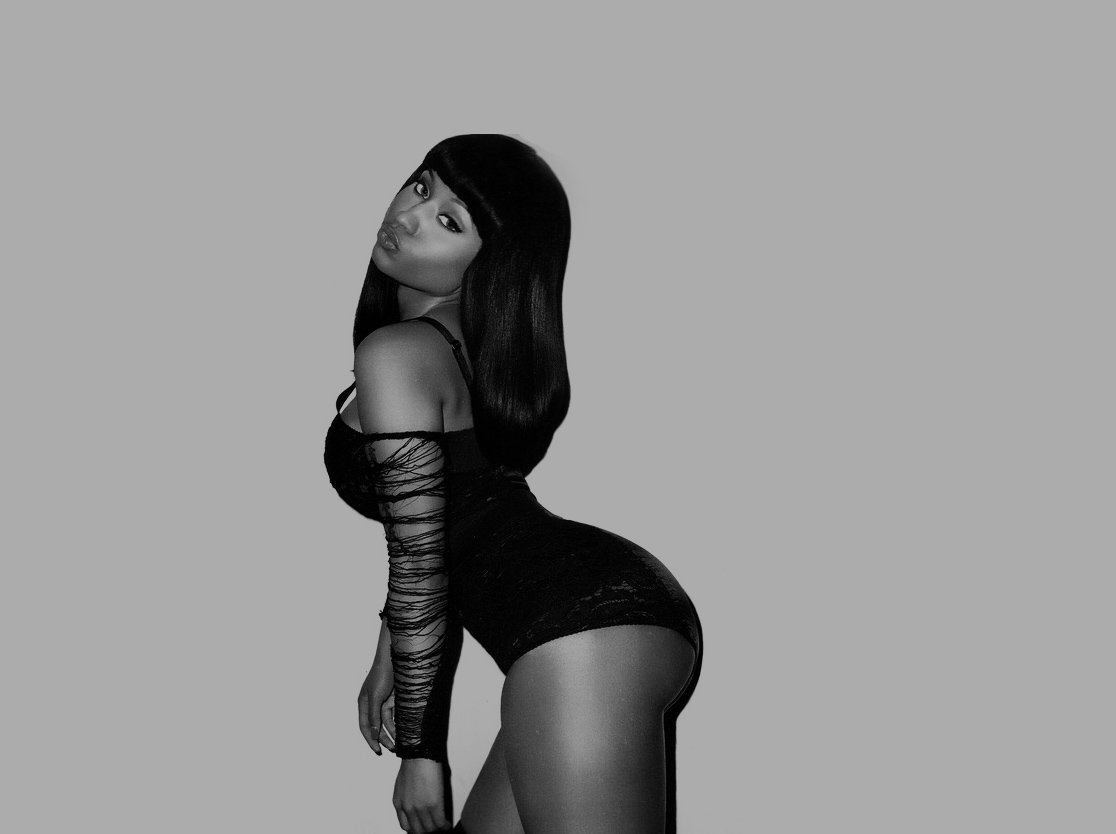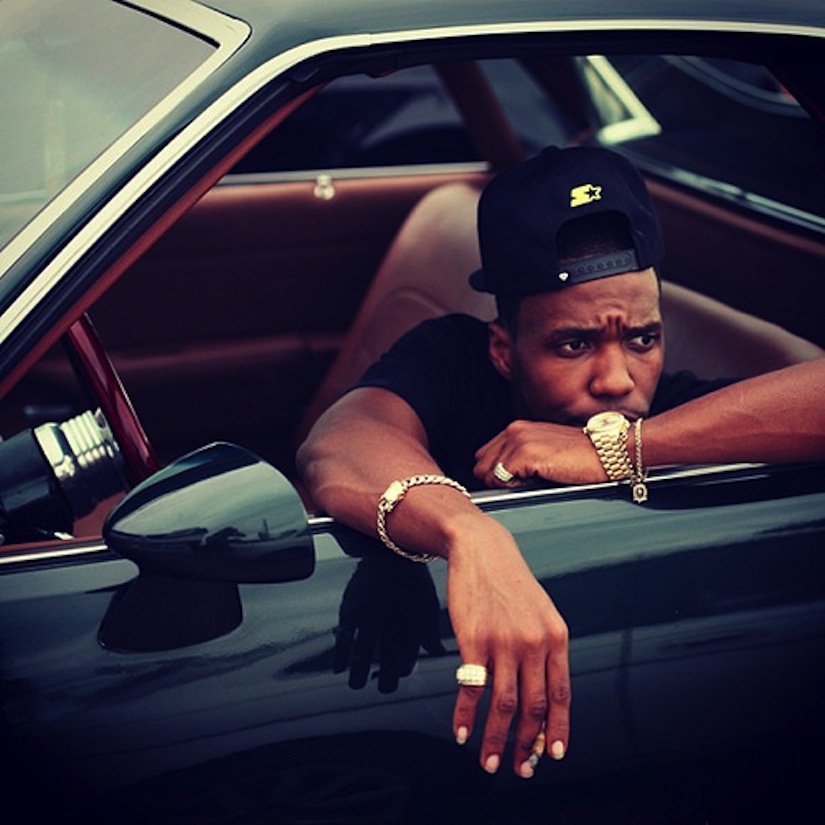Is Nicki Minaj Really 'The Queen' of Hip-Hop?
Let's face it, Nicki Minaj has never been one to shy from controversy or public discourse. She's sexual, abrasive, and at times, down right raunchy, but now that Lil' Kim is pregnant, the public is in need of the next "super femcee". In much the same way that the public is regularly appeased by the rolling out of one addition to our daily lives that make things "diverse" (think Howard Cain's candidacy, the new 'hispanic' Bachelor, Wes Welker at receiver) that are placed there to end the 'controversy' of their absence. In short, if we have one person/thing that's different, we've covered our bases. It's this line of thinking that has vaulted Nicki Minaj to the forefront of females in hip-hop and has raised plenty of talking points on whether she deserves it.
Just before the weekend, Minaj returned from relative silence to drop the song and accompanying visual for "Lookin Ass N**ga." It's a powerful lyrical undertaking that calls to mind her ruthless verse on 2010's "Monster." It's a riveting, bone shaking verse that make plenty of statements and conjectures for the game to take note of, but does it really make Nicki deserving of the 'top female title'? And is she the best image to portray?
Before we get carried away, let's back up. It's an age-old tale in hip hop that anyone without a Y chromosome is placed into a separate category called "female rappers". From there, it splits into two distinctly different camps. For sake of the argument, let's call them the Lauryn and Kim camps, the former being Ms. Hill and the latter, Lil' Kim of Bad Boy fame. Female artists, much more than their male counterparts, are subject to fitting into one of two stereotypes: artistic or ratchet. Either you have the ass to go with the shaky bars and the money that comes with it, or you focus on the craft and sacrifice the fame and money. Female artists have always been highly marketed in hip-hop as sex objects, Lil Kim thrust her pelvis at more front rows than many working girls in attempts to sell records and Nicki Minaj is shrouded by rumors of drastic plastic surgery to achieve that continent-sized backside. But what about the artistry? Sure, Nicki has tremendous skill, that is exemplified in the "Lookin' Ass N**ga" video and beyond, but would she have the same impact, would she be referred to as the best female rapper, if she didn't have the assets?
Artists like Rapsody, Rah Digga, Angel Haze and Jean Grae represent several generations of female artists brave enough to not exploit their femininity for a superficial commercial success. Nicki Minaj is widely regarded as the best female MC in the game, regardless of the fact that her last label project was 2012's Roman Reloaded which, despite debuting at No. 1 thanks to the Cash Money push, was described by Randall Roberts of the LA Times as a "disjointed, artistically confused" album. As much as I can appreciate the skill with which Nicki addresses how people approach her, but how much can she really complain about people looking at her ass when she promotes it more than a Thursday night NBC sitcom? Anyway, my point is, Nicki can do her thing for sure, but I'd rather see someone else get the spotlight for once.
[vimeo id="86541519"]
Curren$y: "442" (Feat. Lil' Wayne & Birdman)
It's been a minute since Weezy and Spitta got together for a track. Regardless, the pair teamed up with Birdman for "442". Staying true to his New Orleans roots, Curren$y got the pair together and dropped the soulful jam on local radio station Q93 late last night. Take a listen here below.
[Sunday Coffee Sipper] Deciphering Drake
Drake. His name is everywhere these days and the Toronto native finds himself smack dab in the center of pop culture lexicon-sandwiched somewhere between Miley Cyrus and the Geico "Hump Day" camel. For all the headlines, videos, interviews and general content that has been produced around Drake, it is interesting that we know so little about someone who shares so much. With a barrage of music released over the past five years or so, Drizzy still remains one of the biggest enigmas in music today.
To be sure, Drake's discography read like entries in a diary. So Far Gone showed us Drake before the fame, working out his inner feelings, wondering what would come next and who was really true while looking inwards for answers. He posed a lot of questions that may have been answered by now. On Thank Me Later he contradicted himself often, telling listeners to thank him now and generally reminiscing over the onset of fame. Take Care was his masterpiece to date, the album that it all came together in harmony, garnering him critical praise from those in and out of hip-hop.
With his latest project, Nothing Was The Same Drake keeps with the melodramatic soul searching that has become his calling card, while also pushing things forward. Currently, the album sits one spot behind New Zealand native Lorde’s debut album Pure Heroine on the iTunes charts. The lead singles from the project, "Started From The Bottom" and "Hold On, We're Going Home" are vastly different, demonstrating the rapper/actor/singer's ability to move seamlessly through his Rolodex of titles with ease.
"Hold On, We're Going Home" itself is a bit departure of style for the former Degrassi: Next Generation star. Without any bars on the record, it is one of the few tracks that Drake exclusively sings on, one that is likely to be played at weddings for a long time. The video for the song also plays into the Drizzy "renaissance" man aesthetic, a cinematic, gun-crazy feature of a visual that gave viewers a look at Drake from many angles at once.
He was criticized for "Wu Tang Forever," as "die hard" rap fans condemned the reference to the iconic group. Talking to U-God in an interview awhile back he spoke of Wu-Babies, descendants of theirs that came up on Wu Tang. Drake, at 26, was certainly the product of listening to RZA, GZA and the like, but the song falls short of doing them justice. It is J. Cole's "Let Nas Down" without the understanding and worldview that made Cole's song an instant classic.
Careful features, like that of Sampha, of electronic duo SBTRKT on "Too Much", as well as 2 Chainz, Birdman and Big Sean are paired with lesser-known features such as Jhene Aiko, Majid Jordan and Detail and continue to demonstrate Drake's innate ability to recognize solid work from a variety of avenues. Drake alleges to have "Started From the Bottom" but even at the top, isn't afraid to shine a wide light on exceptional talent.
Aubrey Graham is a complicated guy who makes uncomplicated music. It is easily digestible, readily relatable and consistent enough for listeners to know what to expect in most regards. For this reason, it's almost impossible to turn on the radio or walk into a party without his voice present. Nothing Was The Same is a continuation of the narrative that Drake has developed since emerging on the scene in 2009. The biggest compliment to an album is it's ability to be listened through as an entirety. The latest offering from the Toronto crooner is no Take Care, but shows development and talent that can't be ignored.
http://youtu.be/GxgqpCdOKak



